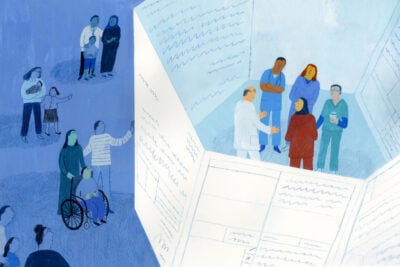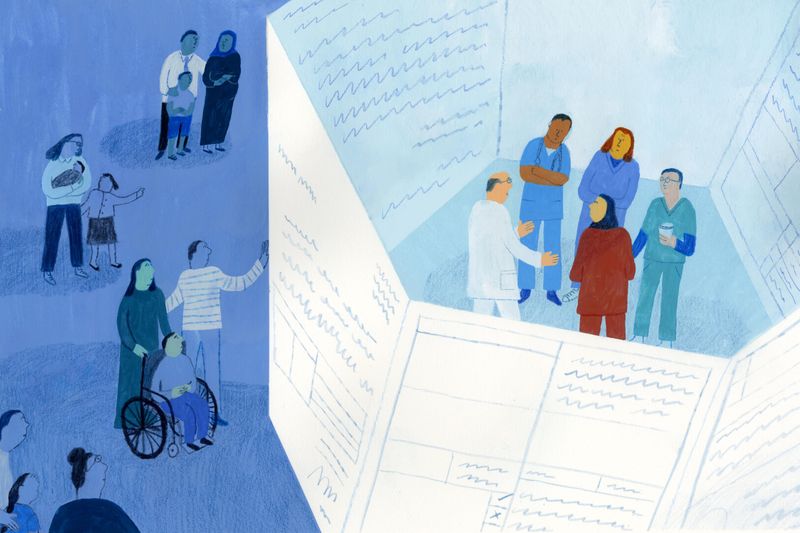
Series: Birth Rights
Investigating Florida’s NICA Program
This article was produced in partnership with the Miami Herald, which is a member of the ProPublica Local Reporting Network.
Florida lawmakers backed a series of sweeping reforms Monday to a controversial state program that protects doctors from medical malpractice lawsuits by limiting compensation for children born with catastrophic brain damage.
Legislation to overhaul the Birth-Related Neurological Injury Compensation Association was approved unanimously Monday afternoon by committees in both chambers of the Florida Legislature: the Senate Appropriations Committee and the House Judiciary Committee. From there, the bills head to the floor of the Senate and the full House.
NICA, as the program is called, came under fire this month when the Miami Herald, in partnership with ProPublica, began publishing a series of stories detailing the plight of families in the program, some of whom say they are forced to plead for medical care and services their children need.
Parents whose children are accepted into NICA receive a lump sum of $100,000 from the program, a figure that has not changed since its inception, and a promise of “medically necessary and reasonable” care for the lifetime of the injured child. By shielding doctors and hospitals from liability for such injuries, NICA reduces malpractice insurance premiums for physicians — the law’s stated intent when Florida legislators created the program in 1988.
Among the reforms endorsed by the committees: increasing the lump-sum payment to $250,000; adding at least one parent of a covered child, as well as a children’s disability advocate, to the NICA board of directors; creating a position for an ombudsman who would advocate for families; money for mental health counseling for parents; and statutory language requiring NICA to cover doctor, hospital and other medical costs that the program currently shifts to Medicaid, the taxpayer-funded insurer for low-income and disabled Floridians.
Lawmakers in the House and Senate heard testimony from parents who expressed gratitude to NICA for helping them face hardship — as well as from parents who said the program wears them down by questioning and denying requests for care.
The obscure state program has amassed nearly $1.5 billion in assets while delaying or denying help to some families, all of whom were barred from pursuing lawsuits against the doctor or hospital that delivered their child.
Kenney Shipley, NICA’s executive director, said she supports the reforms approved by the House Judiciary Committee. But Shipley, who has led NICA since 2002, urged lawmakers to oppose one provision: a measure forcing the program to pay first for doctors, hospitals and other medical care instead of serving as the “payer of last resort” behind Medicaid.
“That particular provision will most likely impair NICA,” Shipley said.
While Shipley defended the program, parents whose injured children are covered by NICA testified about their personal experiences.
Charity Butler, the mother of a 6-year-old boy, Grit, whose care is subsidized by NICA, spoke in both legislative chambers, bringing with her a thick binder of documents she said she needed to provide to program administrators when seeking reimbursement for her son’s care.
“That is hours upon hours upon hours of tears and work and pushback,” Butler said in the House chamber as she held up the binder.
“NICA is failing families, namely by the manipulative culture of claims denial that uses bureaucracy to stymie families from access to the funds that they need,” she said.
Butler said she pays $10,000 out of pocket each year to subsidize nursing care for her son because NICA’s reimbursement rate for in-home nursing care is so low that she can’t hire qualified nurses.
Butler said she wanted the program to “operate with transparency and treat parents with dignity.” She added: “Ours is an exhausting way of life.”
Jayme O’Connell of Old Town, 40 miles southwest of Gainesville, said she is grateful for NICA but urged lawmakers to make the program more responsive to parents and families rather than the interests of doctors, hospitals and insurance companies.
O’Connell brought her 4-year-old daughter, Ivy, who is in the NICA program. Ivy’s father, Ian Kleiner, and Ivy’s brother and sister were also there.
Speaking in both chambers, O’Connell asked legislators to help make the approval process easier for families because NICA currently requires letters of medical necessity, denials from insurers and other documentation before it will approve many expenses.
“Our No. 1 ask,” she said, “is that our children become the No. 1 priority in NICA — not the doctors, not the hospitals and not the shareholders. ... Treat our children No. 1.”

Rock and Shawna Pollock of Anna Maria Island, on the Gulf Coast, spoke in defense of NICA, telling lawmakers they had learned to navigate the program.
Rock Pollock called NICA “the best thing” that ever happened to his son, Rock Jr., now a teenager, and he credited doctors and therapists with knowing “how to write” letters of medical necessity that will persuade the program to cover claims for his son’s care.
Michael Devine, whose daughter Cyra was accepted into NICA in December 2011, said many parents of catastrophically brain-injured newborns are misled by attorneys who urge parents to resist inclusion into the program, promising to seek a lucrative settlement or verdict in the courts.
Devine said the administrative process of applying for NICA is more efficient and less contentious than a civil lawsuit.
“Going through one of these litigation processes is scary,” he said in the House committee hearing. “The NICA process is not.”
Several lawmakers in both committees had done research of their own and expressed dismay — even outrage — over the way families said they had been treated.
Danny Burgess, a Republican who co-sponsored the Senate bill, said families “rely on NICA for everything from diapers and feeding tubes to beds.” And the program “failed families time and time again.”
“It is time for the Legislature to step in,” Burgess said. “We have to work together to fix these wrongs.”
Said Lauren Book, another Senate sponsor: “These parents cry every single day — not because of their child’s severe birth-related disability, but because of their dealings with NICA. Because they are having to fight tooth and nail” for care.
The despair she heard from NICA families who contacted her “reveals the utter brokenness of this program,” Book said. The legislation, she said, would ensure “what I believe is the absolute bare minimum apology we owe these families in this state.”
In advance of Monday’s hearing, Shipley provided lawmakers with a “correcting the record” memo in response to the published articles in which she said NICA has served families well. She said the agency “wholeheartedly supports” increasing the one-time payment from $100,000 to $250,000 and also favors adding a parent to the NICA board, a measure she had previously rejected.
The memo disputed that the program deprives families of benefits. Instead, it said, an average NICA family receives $4.9 million in benefits during their child’s lifetime. The money comes from dues paid by doctors and hospitals, not taxpayers.
The memo also said NICA spends far more on families than on its lawyers. The Herald and ProPublica previously reported that the program paid its lawyers $16.9 million between 1989 and 2020 — more than NICA spent, combined, on therapy and doctor and hospital visits for children during the same period, which was about $10 million. NICA said when parental expenses, nursing care and initial awards are included, it paid $244.3 million in benefits over that time period.
Also Monday, the state’s top financial regulator, Chief Financial Officer Jimmy Patronis, issued a short statement updating several initiatives from his office designed to reform the program.
Patronis said he had issued a “directive” to his office’s consumer advocate, Tasha Carter, “to engage in advocacy efforts on behalf of” NICA families. The directive, he wrote in a statement, was to “coordinate directly with families” in the program and advocate for them before the Division of Administrative Hearings, which resolves NICA disputes.
“These families have been through so much already,” Patronis wrote, “and the idea that they need a doctor’s note for every little request” is something Carter can help fix.





